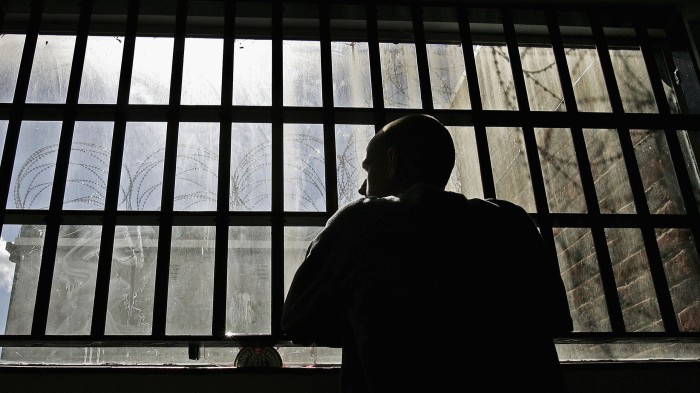The first prisoners arrived at HMP Fosse Way in May 2023.
The new privately run facility outside Leicester was opened as part of efforts to ease the English jail network’s capacity crisis. Less than two years later, it is already close to being full.
“I would like to see fewer people coming to prison,” said Wyn Jones, the centre’s director, who works for the listed contractor Serco. Last month, it had 1,673 inmates, putting it at 98 per cent capacity.
“There are guys in [Fosse Way] that shouldn’t be in here,” he told the Financial Times.
A multibillion pound prison building programme begun under the last Conservative government was intended to fix the crisis that has engulfed England’s creaking prison system.

But inadequate funding to address a backlog of prison maintenance is seeing jail cells taken out of service almost as quickly as new ones are opened, governors have warned — meaning new prisons are doing little to expand the number of places available.
Between 2020 and September 2024, the estimated total value of outstanding maintenance jobs in England and Wales prisons doubled from £0.9bn to £1.8bn, according to the National Audit Office. It found that 4,151 cells had been indefinitely closed since 2010, exceeding the total number added by the two newest jails, Fosse Way and HMP Five Wells in Northamptonshire.
Overall, just 482 places were gained in England and Wales between May 2010 and April 2024, the 14-year period overseen by the Conservatives.
“We’ve had to shed accommodation because it’s no longer fit for purpose,” said Tom Wheatley, president of the Prison Governors Association.
“If you don’t put sufficient money into prison maintenance, you then lose accommodation at roughly the same rate at which you’re building it. That is the story of the last 14 years.”
What resources that are available have been poured into facilities such as heating so cells can remain occupied, governors said, as they struggled to try to accommodate an ever-rising number of inmates.
Sir Keir Starmer’s government has vowed to find long-term solutions to the prisons crisis, appointing Lord James Timpson as minister for the sector, a business leader known for hiring former offenders.
But it has been forced to grapple with the immediate issue of chronic overcrowding, releasing 3,112 people in two batches from September. The move, it hoped, would free up space for 18 months.
While welcoming its emergency decision to release thousands of prisoners early, governors have said that their jails will soon be full again unless ministers reconsider tough-on-crime policies and invest more in maintaining buildings.
A focus on “scoring political points out of announcing a big prison building programme” has had damaging effects, warned Wheatley.
Some governors were already “starting to feel the pinch”, he said, adding prisons were only likely to “limp through to the end of summer”.
Jones, whose prison houses the lowest-risk category of offenders outside of open jails, argued that more convicts like those at Fosse Way should be allowed to serve their time in the community, a sentence that has become increasingly rare as successive governments introduced harsher punishments.

Some 70,664 people in England and Wales were given community sentences in 2023, just 6 per cent of those convicted. That compares to 149,691 people in 2012, or 12 per cent of people convicted that year.
Even when offenders are released and free up space in prison, officials said a lack of investment in support services had increased the likelihood of people simply reoffending and being hauled back to crowded jails.
All 24 regional UK probation delivery units reviewed this year by HM Inspectorate of Probation were rated “inadequate” or “requires improvement” in assessments of their monitoring and support of former prisoners.
The prison at Fosse Way was built by the previous government to focus on “rehabilitating offenders”, with facilities teaching inmates to do work including manufacturing glasses, cutting hair and driving construction vehicles in a simulator.
“But then [we] send you back to the same council estate. You’re pulled back into that lifestyle,” said Jones.
The Ministry of Justice said: “The new government inherited a justice system on the verge of collapse, and took immediate action to address the crowding chaos engulfing our jails.”
It added that long-term measures had begun to ensure “no government runs out of prison places again”. This included a plan for building 14,000 prison places by 2031, but also an independent review of sentencing policy, as well as a commitment to invest £500mn in maintaining prison and probation services.
Wheatley warned, however, that sentencing reforms would not address the tens of thousands of people already occupying cells. Repair work has also been put off because of the limited number of places occupants can be relocated to, he added.
Vital refurbishments could also be severely delayed by the collapse in September of the construction group ISG, one of the prison estate’s biggest contractors, which was due to complete 54 maintenance projects.
This included work to secure Manchester Prison, the FT previously reported, where a recent inspection found 39 per cent of prisoners had failed drug tests as the site was “plagued” by drones delivering illicit items, due to a failing CCTV system and delays installing more secure cell windows.
A report this week by the chief prisons inspector warned that the proliferation of drone deliveries at the site is a “threat to national security”.
Under pressure, prisons are doing “some good work,” Jones insisted. “98 to 99 per cent of people here just want to do their time and go home.”




